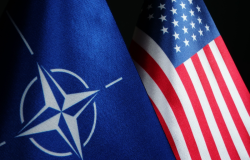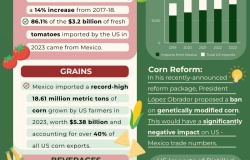Smart Borders, Virtual Borders, or No Borders: Homeland Security Choices for the United States and Canada
Rey Koslowski discussed options for North American border security particularly pertaining to the implications of introducing technologies into border security with an emphasis on the impending requirements of US-VISIT entry and exit procedures.
Overview
Rey Koslowski discussed options for North American border security at this event organized by the Canada Institute and its Toronto partner, the Canada Institute on North American Issues. The public lecture was held at the Rotman School of Management at the University of Toronto. Koslowski presented his insights into the implications of introducing technologies into border security with an emphasis on the impending requirements of US-VISIT entry and exit procedures.
Koslowski began by stating that the U.S.–Canadian Smart Borders Agreement laid the groundwork for the U.S. homeland security strategy to leverage information technology for risk management at the border. U.S. officials now envision the move towards "virtual borders" with the rollout of US-VISIT and increasing use of biometrics, database integration, data mining, and Radio Frequency Identification (RFID) technology. He noted that others envision a "North American perimeter," modeled after the European Union, within which border controls between the U.S. and Canada are lifted. Smart borders cannot be totally virtual because new information technologies still require significant border infrastructure investments and data in order to be effective. Koslowski argued that infrastructure investment for a smart border conflicts with lifting border controls and holding out for no borders may undermine political support for necessary border infrastructure. While many policymakers, businesses, and citizens may wish for no borders, limited political capital and budgetary resources might force tough choices among differing visions for the border.
Koslowski's remarks were based on his research at the Woodrow Wilson Center and on conversations and meetings he had had with customs and port officials in Toronto and Windsor, where he examined the Ambassador Bridge and the Windsor-Detroit tunnel operations and observed the infrastructure requirements for the various proposals for increased border security.
The audience was very engaged in the presentation and appreciative of Koslowski's frankness and insights. Questions came from policy analysts, representatives of Chambers of Commerce, government employees and academics, and covered a range of topics including infrastructure, local politics, bi-national treaties, comparisons to the European Union and the impending threat of a terrorist attack in North America.
Drafted by Cheryl Hoffmann, Program Consultant/Toronto
David N. Biette, Director, Canada Institute 202-691-4133
Hosted By

Canada Institute
The mission of the Wilson Center's Canada Institute is to raise the level of knowledge of Canada in the United States, particularly within the Washington, DC policy community. Research projects, initiatives, podcasts, and publications cover contemporary Canada, US-Canadian relations, North American political economy, and Canada's global role as it intersects with US national interests. Read more
Thank you for your interest in this event. Please send any feedback or questions to our Events staff.










